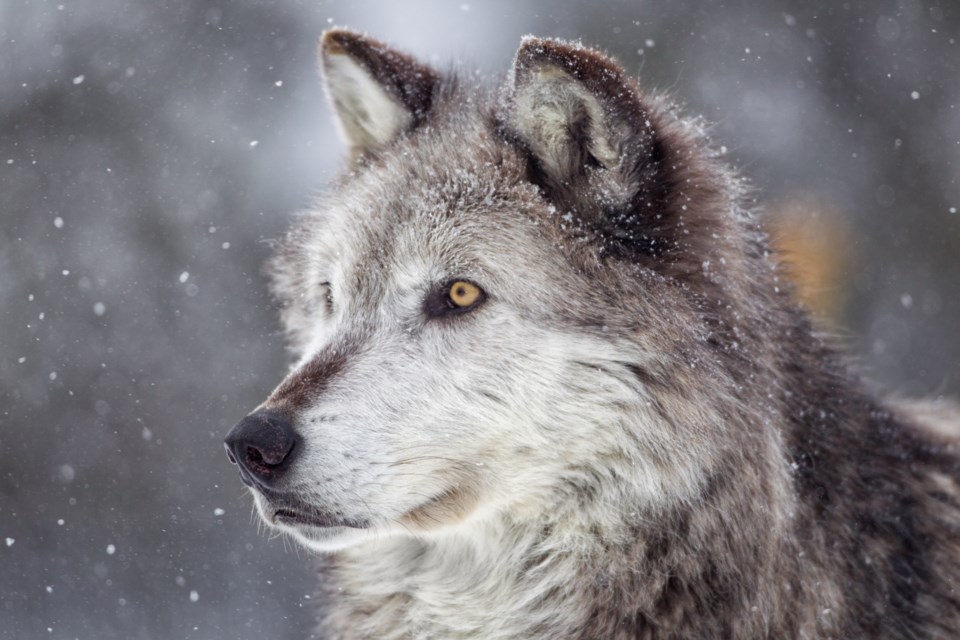DENVER (AP) — Colorado could have to navigate years of pending litigation over the Trump administration's delisting of the gray wolf from the Endangered Species Act as it tries to enact its own voter-approved initiative to reintroduce the predator to the state, top wildlife officials were told Thursday.
Lisa Reynolds, the state's first assistant attorney general, told the Colorado Parks and Wildlife Commission her office expects years of litigation over the federal delisting of wolves, which took effect Jan. 4. That delisting handed over management of wolves in Colorado from the U.S. Fish and Wildlife Service to the state. Indeed, two coalitions of advocacy groups asked the U.S. District Court in Northern California on Thursday to overturn the U.S. government decision.
Though delisting made it easier for Colorado to act, legal uncertainty over the future of the wolf's endangered status — even a potential reversal of the administration's decision — could hand authority back to the federal government, severely complicating the state's ability to implement the proposition, Reynolds said.
Colorado voters narrowly approved Proposition 114 in November. It requires the reintroduction of the gray wolf, which was hunted, trapped and poisoned into extermination here in the 1940s, be underway by Dec. 31, 2023, on public lands in the sparsely populated Western Slope of the Continental Divide.
Dozens of rural county commissions and agricultural, business and sportsmen's groups opposed the initiative. They cited a threat to livestock and to a $1 billion hunting industry based on elk, deer and moose that supports 25,000 jobs.
The measure passed thanks to votes from the highly urbanized areas that line the Denver-Fort Collins-Colorado Springs metropolitan area.
Advocates see reintroduction in Colorado as a vital step in restoring the wolf to habitat stretching from the Canadian to the Mexican border. Wolves were reintroduced in the Northern Rockies in the 1990s. About 2,000 wolves are in Montana, Wyoming, Idaho, Oregon, Washington and northern California, and Colorado officials are consulting those states in its own planning, said Eric Odell, species conservative program manager for Colorado Parks and Wildlife.
A remnant population in the western Great Lakes region has since expanded to about 4,400 wolves in Michigan, Minnesota and Wisconsin. A small population of Mexican gray wolves remains protected in the Southwest.
At least two lone wolves and a small pack, likely from Wyoming's Yellowstone National Park, have been sighted since 2019 in northwestern Colorado, Odell said.
Opponents of the initiative said that shows wolves already are in Colorado and that reintroducing them is unnecessary.
Democratic Gov. Jared Polis has urged Colorado Parks and Wildlife to quickly implement the initiative. Dan Gibbs, executive director of the state Department of Natural Resources, challenged the commissioners on Thursday to get paws on the ground by 2022 or early 2023, well ahead of the proposition's deadline.
"The voters have spoken. The directive is clear," Gibbs intoned.
By spring or summer, state wildlife officials will start identifying donor populations and locations for reintroduction; slowly begin development of a management plan; and create procedures for settling claims by ranchers, farmers and others who lose livestock to or have property damaged by wolves.
Part of the effort will be led by a working group involving state and federal agencies such as Fish and Wildlife, the Bureau of Land Management and the U.S. Forest Service, as well as Native American tribes, said Reid DeWalt, a CPW assistant director.
Several witnesses implored commissioners to fully involve West Slope residents in the process. Managing their worries and expectations among residents still polarized over the issue is as great a task as any, Odell said.
"The greatest challenge to us is social and political, rather than biological issues," he said. "That's part of wildlife management."



